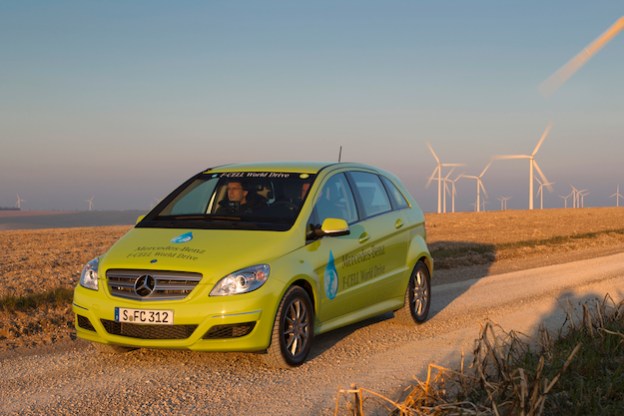
Motor Authority is reporting that Mercedes-Benz has officially delayed its hydrogen fuel cell vehicle for at least another four years while it seeks a partner automaker.
The Mercedes hydrogen car is called the F-Cell and is based upon its B-Class car. If you’re not familiar, that’s surely because we don’t get the B-Class Stateside.
Last time we heard about F-Cell, Mercedes aimed to send the hydrogen fuel cell vehicle to production in 2014. Apparently the German automaker woke up and smelled the roses, realizing there simply wasn’t a strong enough hydrogen fueling infrastructure to hit the 2014 mark. Buying some time, Mercedes set 2017 as an ideal future production date.
For now, Mercedes is seeking another automaker with which to produce the F-Cell. Currently, Mercedes has a technology sharing partnership with Renault Nissan. In fact, Nissan’s luxury brand, Infiniti, will produce a compact luxury car based upon the Mercedes B-Class in the next few years. This Infiniti pairing could prove an ideal solution to Mercedes hydrogen woes.
Infiniti has already dedicated itself to producing alternative energy-powered vehicles. A hydrogen fuel cell could make a perfect addition to its increasingly diverse powertrain lineup. The only issue will be for Mercedes to convince Infiniti that the move is a prudent one. After all, there’s a reason Mercedes has stalled its plans: infrastructure.
Just yesterday Toyota and BMW announced a similar partnership to produce, among other things, fuel cell vehicles. Perhaps this could be enough evidence of viability to get Renault and Nissan onboard.
Surprisingly, Toyota aims to sell a hydrogen fuel cell vehicle by 2015 so perhaps there is something Toyota knows that Mercedes doesn’t.
We’ve always been a bit skeptical of hydrogen, as the power input to create hydrogen is far greater than the resulting product – at least for now. But that could all change very soon, as ongoing research is proving that this concern, like gasoline-powered vehicles, may soon be a thing of the past.


